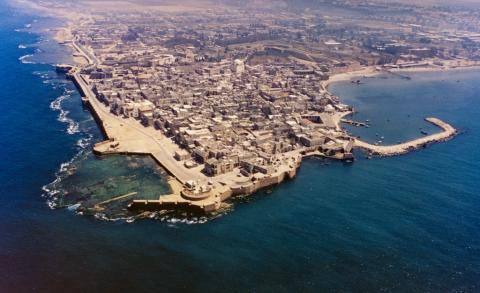In Europe, on one occasion, remembering the desperate days in Tihran when Bahá’u’lláh was incarcerated, their home sacked and their properties confiscated, ‘Abdu’l-Bahá could yet say, ‘Detachment does not imply lack of means; it is marked by the freedom of the heart. In Tihran, we possessed everything at a nightfall, and on the morrow we were shorn of it all, to the extent that we had no food to eat. I was hungry, but there was no bread to be had. My mother poured some flour into the palm of my hand, and I ate that instead of bread. Yet, we were contented.’
Poverty
While Bahá’u’lláh was in Baghdad, still in possession of great wealth, He left all He had and went alone from the city, living two years among the poor. They were His comrades. He ate with them, slept with them and gloried in being one of them. He chose for one of His names the title of The Poor One and often in His Writings refers to Himself as Darvish, which in Persian means poor; and of this title He was very proud.
Jesus was a poor man. One night when He was out in the fields, the rain began to fall. He had no place to go for shelter so He lifted His eyes toward heaven, saying, "O Father! For the birds of the air Thou hast created nests, for the sheep a fold, for the animals dens, for the fish places of refuge, but for Me Thou hast provided no shelter. There is no place where I may lay My head. My bed consists of the cold ground; My lamps at night are the stars, and My food is the grass of the field. Yet who upon earth is richer than I? For the greatest blessing Thou hast not given to the rich and mighty but unto Me, for Thou hast given Me the poor. To me Thou hast granted this blessing. They are Mine. Therefore am I the richest man on earth.
The other meeting was held at the Bowery Mission Hall to help and assist the poor and destitute. First ‘Abdu’l-Bahá spoke on the subject of the station of poverty and gave the men hope for the future. His words were so penetrating that even those who were not poor became envious at ‘Abdu’l-Bahá’s description of the station of poverty. The report of this meeting was publicized in many newspapers. When ‘Abdu’l-Bahá finished His talk, He said He wished to serve the poor. The chairman announced that ‘Abdu’l-Bahá would stand near the door so that they could come to Him from one side and then leave from the other. It was an impressive sight. The Master showered His kindness on each one and gave each of them some coins. Because there were about four hundred people, some said that the Master’s money would not suffice; there would not be enough for all of them. Instead, some money was left over, which was given to other destitute people and children outside the Bowery.
'When He reached the Occident, however, ‘Abdu’l-Bahá faced a condition which troubled Him greatly, because it was beyond His power to assuage the misery He saw constantly about Him. Housed luxuriously at Cadogan Gardens, London, He knew that within a stone's throw of Him were people who had never had enough to eat -- and in New York there was exactly the same situation. These things made Him exceedingly sad, and He said: "The time will come in the near future when humanity will become so much more sensitive than at present that the man of great wealth will not enjoy his luxury, in comparison with the deplorable poverty about him. He will be forced, for his own happiness, to expend his wealth to procure better conditions for the community in which he lives."'
